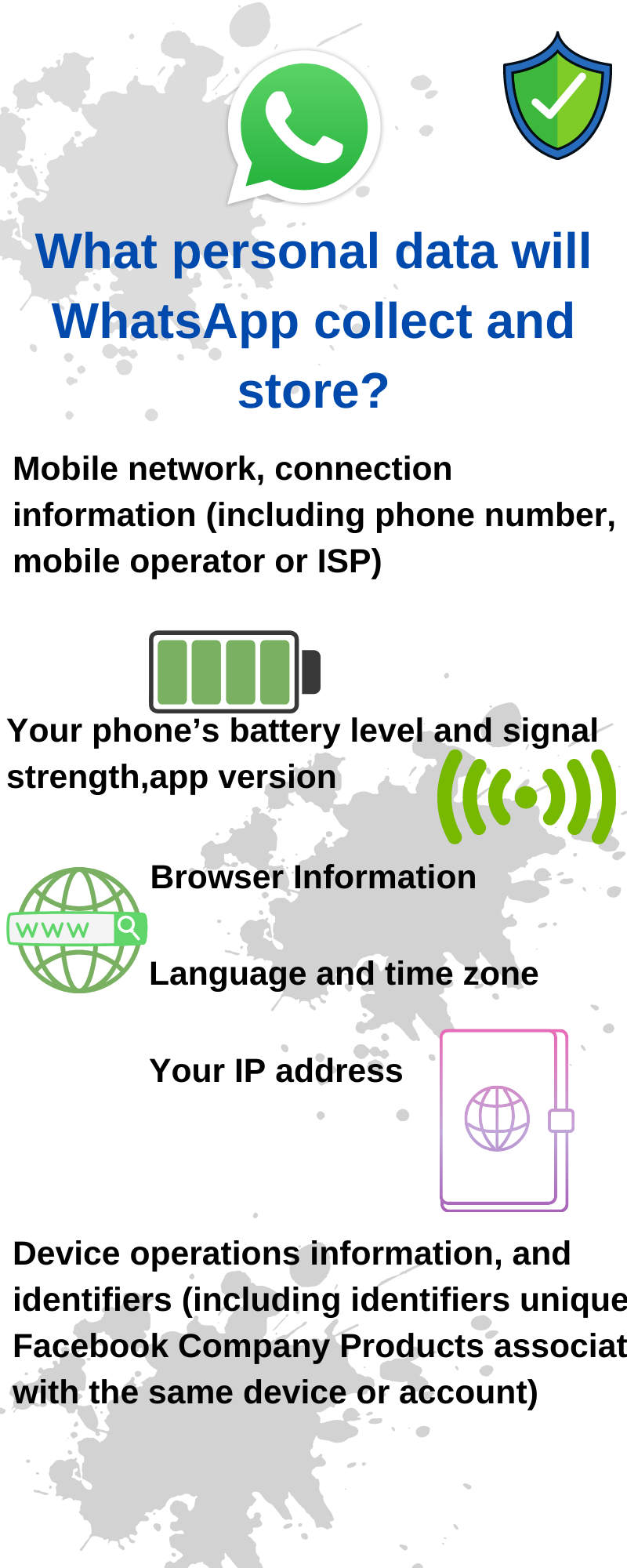Delhi: Updated terms help WhatsApp to integrate more closely into Facebook's family of products, as it aims to provide a more coherent experience to users across services. While the changes help Facebook to achieve its larger goals, the high-level of data sharing that WhatsApp users may raise privacy concerns. Col. Inderjeet Singh, Cybersecurity Expert, Director General, Cyber Security Association of India further explains the changes in WhatsApp's privacy policy.

As per Col, Inderjeet, there are three major changes coming to WhatsApp in 2021. Key updates include information about:
- How WhatsApp processes your data.
- How businesses use Facebook services to store and manage WhatsApp chats.
- How WhatsApp will integrate with other Facebook products.
Users that agree to the updated terms will have their WhatsApp account registration and phone number, transaction data, service-related information, interaction information, mobile device information, IP address, and "other information identified or obtained upon notice to you or based on your consent and then shared with Facebook.
When explaining how Facebook will use this information, the policy states that shared data is used for "understanding how our services or theirs are used," "improving their services," "making suggestions for you," "personalizing features and content," and "showing relevant offers and ads across the Facebook Company Products."
So, why do I need to accept this policy?
If you do not accept WhatsApp’s latest terms and conditions, you will no longer be able to use the app post on February 8, 2021. Your account will be deleted, but your data will not be. So, you must accept the policy to continue using WhatsApp. To do so, whenever you see the new policy popup on your screen, tap on AGREE to continue using the messaging platform as usual.
What personal data will WhatsApp collect and store?
It also collects device-level information like what device you use, your mobile network, IP address, among others. It also collects and uses precise location information from your device, but with your permission.

According to its new policy, WhatsApp will collect hardware data such as:
- Mobile network, connection information (including phone number, mobile operator, or ISP),
- Your phone’s battery level and signal strength,
- app version,
- browser information,
- language and time zone,
- your IP address,
- device operations information, and identifiers (including identifiers unique to Facebook Company Products associated with the same device or account).
As per Col. Inderjeet that none of this was part of the previous policy.
What about your messages?
WhatsApp has reiterated that all messages are end-to-end encrypted. This means that neither WhatsApp, not third parties will access or read your messages.
“Nothing you share on WhatsApp, including your messages, photos, and account information, will be shared onto Facebook or any of our other family of apps for others to see, and nothing you post on those apps will be shared on WhatsApp for others to see,” WhatsApp says.
WhatsApp doesn’t store your messages once they’ve been delivered. Messages are stored on the user’s device and not on WhatsApp’s servers. Once messages are delivered, they are deleted from their servers.
What about your transaction data?
Now that WhatsApp has launched a payments feature in India, it says that if you use WhatsApp Pay, additional information, including payment account and transaction information is processed by the company. This is the information required to complete the transaction such as payment method, shipping details, and transaction amount.
“If you use our payments services available in your country or territory, our privacy practices are described in the applicable payments privacy policy,” it adds.
What information will WhatsApp share with Facebook?
According to the policy changes, WhatsApp can share almost all of the information mentioned above with Facebook. The terms clearly state that your phone number, IP address, mobile device information, how you interact with others and businesses, etc.
WhatsApp Privacy Policy FAQs
Why you won’t be able to use WhatsApp if you don’t accept the new T&C?
WhatsApp has made it mandatory for all users to accept the new policy changes. If you do not agree to the updates by February 8, 2021, your account will be deleted, and you will not be able to recover it. So, there are no two ways about it. If you want to continue using WhatsApp, you must accept the new terms and conditions.
How do I maintain privacy on WhatsApp?
From now on, your data from WhatsApp, such as your phone number, businesses you interact with, etc., will be shared with Facebook. However, your chats will continue to be encrypted end-to-end, so they are still private.
What about businesses and third-part services?
WhatsApp’s recently launched WhatsApp Business, which allows businesses to contact and communicate with customers through its app. This could include making purchases through the app, or businesses contacting you, sending you order confirmations, flight tickets, tickets to other events, etc. The updated policy states that any content shared with a business on WhatsApp will be accessible by “several people in that business.”
While chats between you and a Business are end-to-end encrypted, WhatsApp says that once the message is received, it will be subject to the business’s own privacy practices.
Some businesses will be able to choose WhatsApp’s parent company, Facebook, to securely store messages and respond to customers. While Facebook will not automatically use your messages to inform the ads that you see, businesses will be able to use chats they receive for their own marketing purposes, which may include advertising on Facebook. You can always contact that business to learn more about its privacy practices.
Also Read: WhatsApp revised Terms and Privacy Policy
What about Ads?
WhatsApp does not allow third-party ads on its services. “We have no intention to introduce them, but if we ever do, we will update this Privacy Policy,” it says. However, WhatsApp can use the information it has about you to communicate to you about its services and market its services and those of other Facebook companies.
Does WhatsApp sell data?
WhatsApp will be using your information to target you with services or products that may interest you. In the future, it will possibly use your data to show you personalized Ads in the same way that Facebook, Instagram, Google, and others do.
What about WhatsApp Payments data?
WhatsApp recently rolled out payments in many countries, and the new privacy policy talks about this too. It says that if you use WhatsApp payments services, additional information about you will be processed, such as your account and transaction information. However, this might differ from country to country according to local regulations.
What choice do you have?
To continue using WhatsApp, you need to accept the new terms and conditions. If you do not wish to, WhatsApp too, suggests deleting your account.
For users who have already accepted the new terms and conditions, but do not want WhatsApp to share data with Facebook, or other businesses, they will have an additional 30 days to opt-out and delete their account.
Should I delete my WhatsApp account?
WhatsApp says that when you delete your WhatsApp account, your undelivered messages are deleted from its servers along with any of your other information it no longer needs to operate and provide its services.
However, users must ensure they not only uninstall WhatsApp, but must delete their account from WhatsApp. This can be done by going to settings > Account and selecting ‘Delete my account’.
Please remember that when you delete your account, it does not affect the information other users have relating to you, such as their copy of the messages you sent them.
Clarification by WhatsApp on Privacy Policy
The recent terms of service update have received quite a backlash as it was mandating sharing data with Facebook. The new tweet from Musk further caused a stir, upping the chance of users ditching WhatsApp for Signal. Now, WhatsApp has issued another statement where it clarifies the policy update.
"To further increase transparency, we updated the privacy policy to describe that going forward businesses can choose to receive secure hosting services from our parent company Facebook to help manage their communications with their customers on WhatsApp,"
Col. Inderjeet adds that the key highlight here is that WhatsApp won't be changing its data-sharing practices with Facebook. However, the update concentrates mainly on WhatsApp and Facebook business accounts. This means, starting February 8, non-business WhatsApp account's data sharing will remain the same. However, those who decline the update will still lose their account.
Does This Change Anything? "To further increase transparency, we updated the privacy policy to describe that going forward businesses can choose to receive secure hosting services from our parent company Facebook to help manage their communications with their customers on WhatsApp," the statement further noted.
WhatsApp has been sharing some of the user data with its parent company Facebook. The list includes phone numbers, payment information, user content, email id, contacts, device ID, location, advertising data, and so on. Even with the new terms of service update, WhatsApp will continue sharing your data with Facebook.
To note, WhatsApp has been sending in-app notifications about the update with links to the details of the update. The notification comes with a single 'Agree' button below. Not agreeing to the update by February 8 means you could lose your WhatsApp account.
Recently, WhatsApp had also mentioned that it will extend its rollout date from February 8th to May 15. To know more, click here:-
New data privacy policy of WhatsApp delayed by 3 months
You can follow Col. Inderjeet on twitter @inderbarara, insta:inderbarara
Also Read: Which Chat App After WhatsApp, Signal or Telegram



